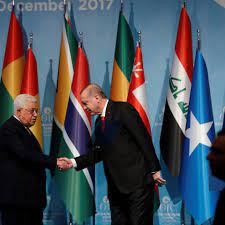
Turkey’s commitment to supporting the Palestinian cause continues to manifest in its diplomatic actions. In a recent development, Turkey announced plans to invite Palestinian President Mahmoud Abbas to address its parliament. This invitation underscores Turkey’s long-standing support for Palestinian statehood and rights, and comes amidst heightened tensions in the Middle East.
Background of Turkey-Palestine Relations
Turkey has historically been a vocal supporter of the Palestinian cause, advocating for the recognition of an independent Palestinian state. The relationship between Turkey and the Palestinian leadership has been characterized by diplomatic, economic, and humanitarian support. Turkish President Recep Tayyip Erdoğan has frequently criticized Israeli policies towards Palestinians and has called for international recognition of Palestinian sovereignty.
See Here:
The Invitation to President Mahmoud Abbas
According to Turkish state media, the invitation for President Mahmoud Abbas to address the Turkish Grand National Assembly marks a significant gesture of solidarity. This move comes at a time when the Palestinian issue remains a contentious point in international relations, with debates surrounding the status of Jerusalem, the expansion of Israeli settlements, and the broader peace process.
Purpose and Timing
The timing of the invitation is noteworthy, as it aligns with ongoing regional discussions about the future of the Israeli-Palestinian conflict. By inviting President Abbas to speak before the Turkish parliament, Turkey aims to reinforce its position on Palestinian statehood and human rights. It also seeks to send a message to the international community about the importance of addressing the grievances and aspirations of the Palestinian people.
Regional and International Implications
Turkey’s Position in the Middle East
Turkey’s invitation to President Abbas is part of a broader strategy to assert its influence in the Middle East. As a regional power, Turkey has sought to play a mediating role in conflicts and has been involved in various diplomatic initiatives. The support for Palestine is also a key aspect of Turkey’s foreign policy, which often emphasizes the rights of Muslim communities worldwide.
Response from Israel and Other Nations
The invitation may also draw reactions from other countries, particularly Israel. Relations between Turkey and Israel have been strained over the years, with disagreements over the treatment of Palestinians being a major point of contention. This move could further complicate relations, especially if President Abbas uses the platform to criticize Israeli policies. Meanwhile, other nations, particularly those in the Arab and Muslim world, may view Turkey’s actions favorably as a strong show of support for the Palestinian cause.
Expectations from President Abbas’s Address
Should President Abbas accept the invitation, his address to the Turkish parliament will likely focus on the challenges facing the Palestinian people, including issues of sovereignty, human rights, and the ongoing blockade of Gaza. He may also call for international support in achieving a two-state solution and highlight the importance of unity among Palestinian factions.
Conclusion
The potential address by President Mahmoud Abbas to the Turkish parliament is a significant diplomatic event that underscores Turkey’s unwavering support for the Palestinian cause. It reflects Turkey’s active role in Middle Eastern politics and its commitment to advocating for Palestinian rights on the international stage. As the situation in the region remains complex, this gesture may contribute to ongoing discussions and efforts towards a peaceful resolution of the Israeli-Palestinian conflict.





